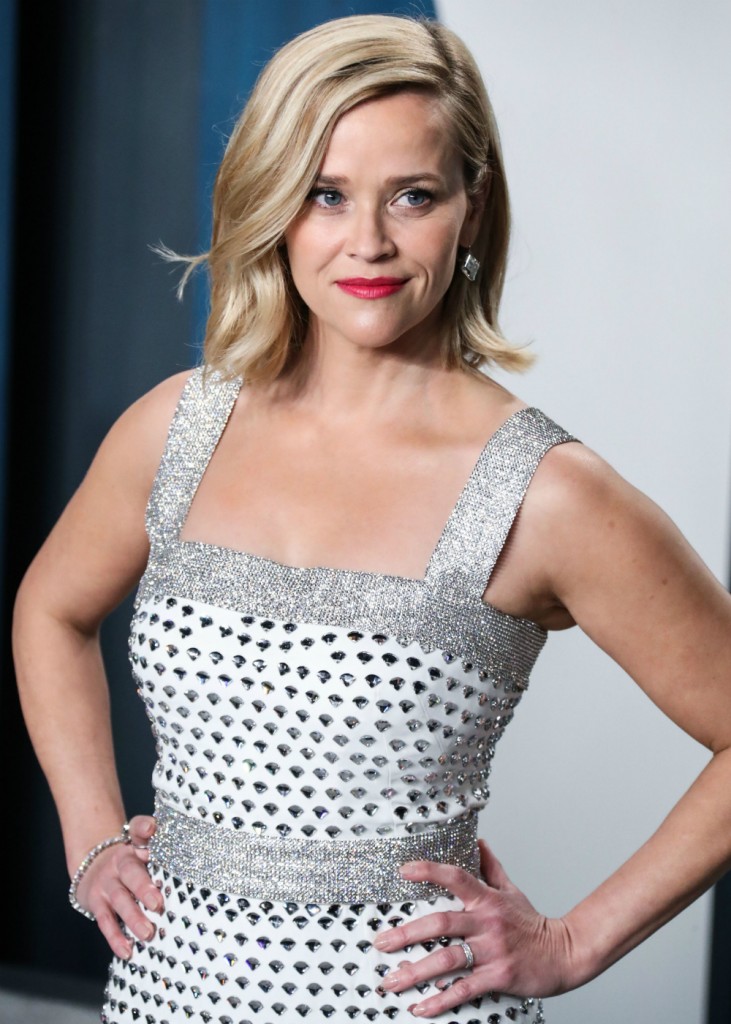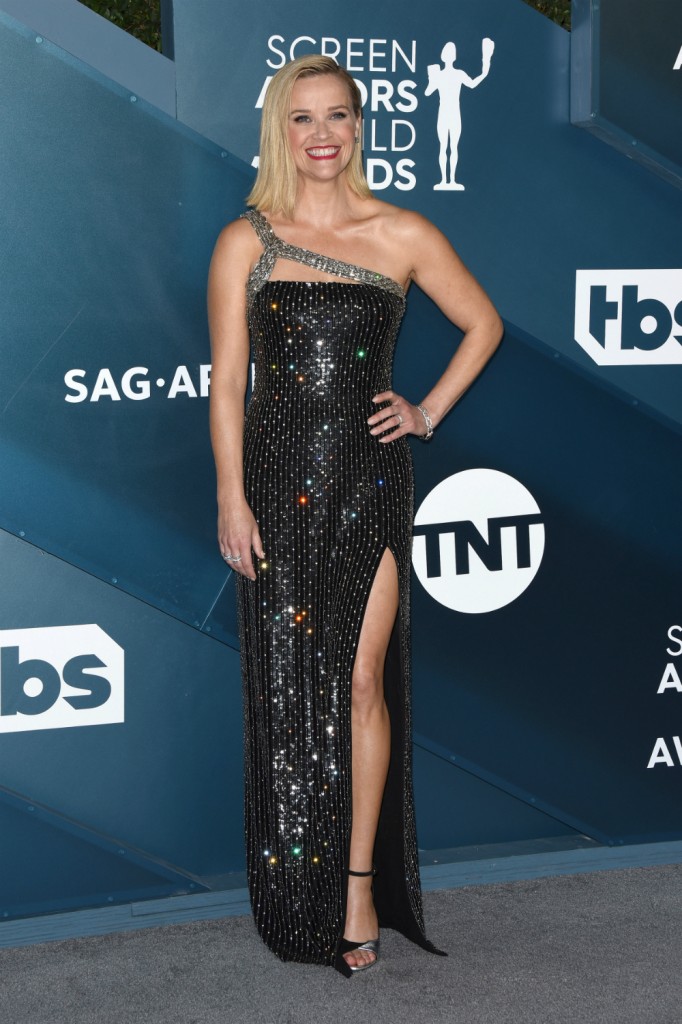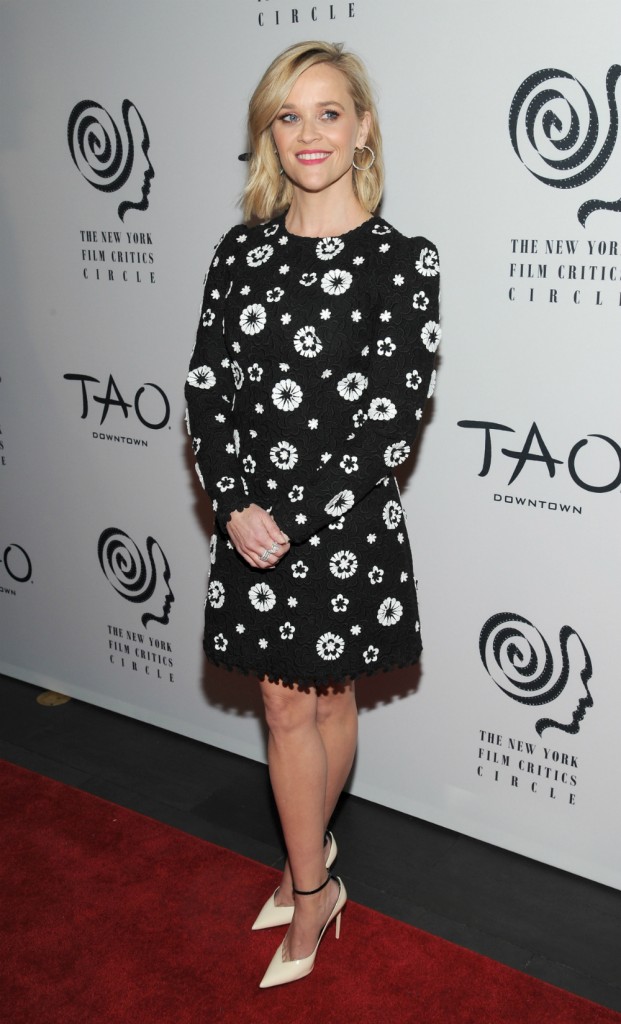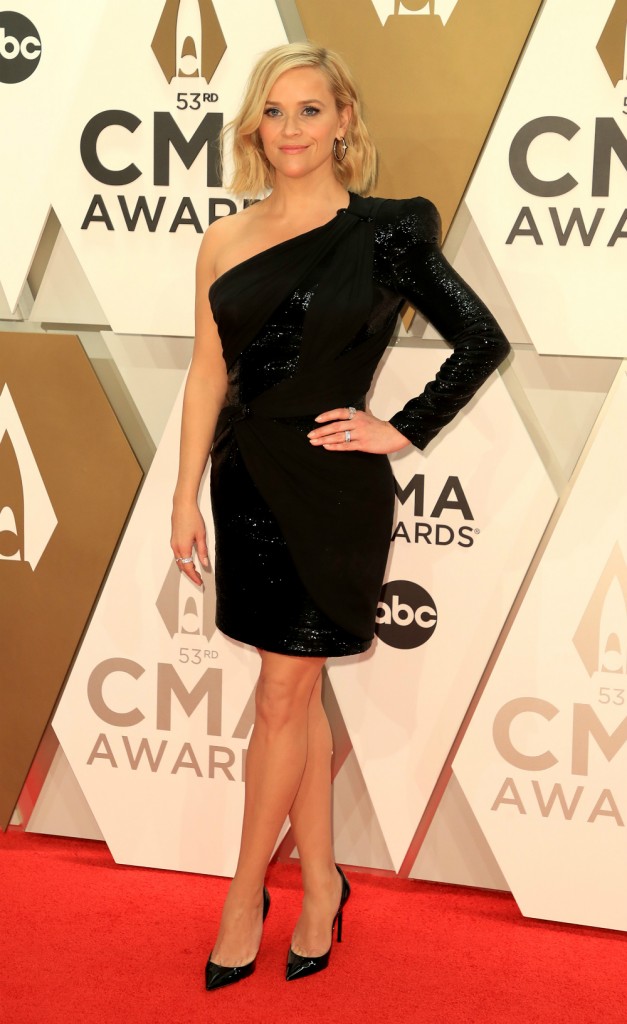Jameela Jamil has a podcast, which I did not know and have listened to exactly one episode. It’s called I Weigh and the bio blurb says the podcast, “challenges society’s definition of worth through weight by asking different thought-leaders, performers, activists, influencers, and friends about how they are working through their past shames to find where their value truly lie.” However, based on her discussion with Reese Witherspoon, it sounds like Jameela is trying to touch on a wide range of mental health issues and women’s issues. In their discussion, Jameela and Reese discussed looking after ourselves and how we benefit from therapy, something Reese said she started at the age of 15. But Reese said the one area she didn’t get help was when she experienced postpartum depression, which she had to varying extents with two of her kids, and had no information as she was going through it.
“After each child, I had a different experience,” she told Jameela. “One kid, I had kind of mild postpartum, and one kid, I had severe postpartum where I had to take pretty heavy medication because I just wasn’t thinking straight at all. And then I had one kid where I had no postpartum at all.”
“We don’t understand the kind of hormonal roller coaster that you go on when you stop nursing,” Reese continued. “No one explained that to me. I was 23 years old when I had my first baby and nobody explained to me that when you wean a baby, your hormones go into the toilet. I felt more depressed than I’d ever felt in my whole life. It was scary.”
During the interview, the actor recalled not having any “guidance or help” during her postpartum depression. Instead, Reese said she “white-knuckled back” to herself.
“I think hormones are so under-studied and not understood,” she explained. “I kept reaching out to my doctors for answers. There just isn’t enough research about what happens to women’s bodies and the hormonal shifts that we have aren’t taken as seriously as I think they should be.”
“I have deep compassion for women who are going through that. Postpartum [depression] is very real,” she declared.
As I said, I did listen to the podcast, but I used Buzzfeed’s transcription because they hit on what I wanted to talk about (notice how I avoid saying I’m lazy). Part of the lead-in discussion to the PPD topic was both ladies saying that had women been allowed in medicine earlier, women’s issues would have been addressed sooner and more completely. I think this is a valid point. Reese said a couple of times that she was so young when she was going through her hormonal roller coaster and nobody talked to her about what she was experiencing. I was in my mid-to-late 30s when I went through mine and nobody talked to me about it either. I do think hormonal issues are still largely left out of the discussion unless someone brings it up and I cannot figure out why. I just had my expired IUD removed after being put on the pill for menopausal issues and have been suffering from a three-day, on-again, off again migraine as a result. I thought I brought it on myself with diet and stress but my very first google search said nope, it’s because I’m on the sugar pill week. It’s as if women are just expected to know everything about our bodies on our own. Or, even worse, we’re expected to simply deal with everything, preferably in silence.
Jameela brought up Reese’s Draper James giveaway as an example of how much Reese is giving back to teachers. The podcast dropped right around when we heard that the giveaway went awry. It’s possible Reese didn’t know how poorly things had turned out when they recorded, which is too bad because this would have been a great time to address the issue and take back the narrative.
Lastly and slightly unrelated, I cannot tell you how much I enjoyed the adaptation of Little Fires Everywhere on Hulu. I loved that book and always get a little nervous about adaptations, but they did such an amazing job addressing all the messages in the story. And honestly, it might be the best work I’ve ever seen from both Reese and Kerry Washington. I know they’re talking sequel but I kind of hope they don’t. I’m sure they will do a nice job with whatever they create (the book does not have a sequel) but I feel like some of the questions brought up in the story need to be left unanswered for the reader/viewer to decide.
Photo credit: WENN Photos















I actually think PPD is waaaaay under diagnosed.
After the births of all three children, I had something that i now know is called ‘intrusive thoughts’ as well as mid range social anxiety/agoraphobia.
When my kids were little I would break out in a sweat imagining all sorts of horrific things: the house burning down with the kids inside, the baby climbing out the window and falling to his death and on and on.
Years later I confided to some friends about these things and they all confessed they all had experienced the same thing during our babies’ first year.
I now know it’s PPD but never guessed.
Ugh, the intrusive thoughts are the worst. I have a 7 month old and I don’t talk about them to anyone because I hate letting them even be out in the universe more than they have to be. I love her so much my heart always feels about to burst, and I’m lucky that I bonded so strongly with her immediately, but I have days where I definitely feel like I’m only about one or two steps ahead of PPD.
Postpartum anxiety is very common. It’s not as severe as PPD so it doesnt get as much attention. Most days I could live life normally but when those intrusive thoughts came in they could turn so obsessive. I was screened for PPD after my first and told I was fine. It was only after I had my second and had gone through the initial phase of overwhelming anxiety that I was told postpartum anxiety is an actual thing. Any new moms out there panicking over every little thing or obsessing over terrible thoughts please reach out for help. You are definitely not alone.
10 months postpartum with my second. My first was a breeze postpartum but my second has been brutal (probably because I also have a three year old this time around). I was diagnosed with PPA with intrusive thoughts and was seeing a therapist. I couldn’t even take my toddler to the playground because in my mind I’d see him fatally fall off the structure. I’d be in tears if my husband took him for a walk, envisioning him running into the street. Thank god everything started resolving a month before shelter in place. A few months ago I was sobbing every day feeling so lonely and hopeless. I don’t know where my mental health would be right now if I didn’t have the means for therapy or I didn’t have supportive family and friends. Community is huge after having a baby. My hearty goes out to everyone giving birth during a pandemic and can’t access services or the support of friends/family when you need it most. Mental health care is so, so important.
I just had a dream where we left our 7 month old in his stroller at the top of a mountain. It was horrible, thank god for waking up.
Women are stuck in this cyclical trap of keeping up. We have a baby and are plunged into darkness but it’s completely unexpected bc if what we see from our friends and social media-but those are the images of those who either aren’t suffering but have recovered and are trying to cover it up.
I’ve been there myself, I thought everything would be easy because that’s all I saw and didn’t know any better-I didn’t have any sisters or close friends with kids who might give me a real clue.
And when I recovered I found myself trying to make it look better, like I was one of those easy perfect moms too. I was embarrassed, I didn’t want anyone to know that I wasn’t as perfect as all those other “perfect” moms out there.
So I’m grateful to those who are putting it out there and I’ve made a point to put myself out there for my sister and sister in law so they have a better shot than I did.
I never thought I had hormone issues, but now I have diabetes type 1 and it’s clear my hormones are often interfering with my metabolism. And I now know that I have a very different reaction to hormone imbalances as I get slightly giddy whenever they go in overdrive. Post-partum I had hysteric fits of laughter.
That is awesome they are talking about ppd. Just hearing others share can help so many mothers who are suffering.
It’s stunning to me how we’re, as women, expected to go through unbelievable transformations without a hitch and with smiles on our faces. Between first periods and last, there’s not a man alive who could maneuver our road. And right after we have our babies, we’re left asea to blindly swim ashore. And then we’re judged on how long it takes us. Some need to tread. Some need a boat rescue. And sadly some drown. It’s vital that each woman gets whatever she needs to ‘get back’ to her baby regardless of method. And that each woman can share if she chooses without condemnation from other women.
That last part is essential, with so many women online behind a screen the mom shaming is out of control. That attitude of “well I did it so you should be able to” is what’s so dangerous and hateful to me. Just because one woman didn’t struggle after giving birth that has nothing to do with anyone else. We’re all very different people with different life experiences and brain chemistries, and it’s ok that we handle things differently, one is not better than the other. I wish we could give each other support and space to just be, without all this constant competition.
Mabs that was beautifully written. Your words need to be on obgyn walls everywhere!!!
Thank you ❤️
I am not a mother but I do believe this is a subject we should be talking more about. I’ve only had one friend who has suffered from this and people didn’t have any understanding for it. I was so surprised, everyone made it seem like she was overreacting and being drama about it but she just wanted to let so many things out. And at the end of the day she was left with friends like me just to listen to her and I wouldn’t even know what to say cause I didn’t go through any of that. She however never said anything like you don’t know what it’s like. I think she just needed people around who at least could imagine it. Can I just say that it was mostly other moms that never got it.
Also thanks for mentioning Little Fires Everywhere, I slept on it somehow but today I have a day off and it’s soooo good for bingeing. Also, Reese totally deliveres her character and so does Kerry.
If you have depression you are at a greater risk of getting PPD. I had read that and took it seriously. Then one night in the first few weeks of my first babies life I had a horrid nightmare. I dreamt a little, blond baby followed me up a ladder and if he touched me I would die.
Cue to my little, blond baby awaking and crying for me to breastfeed him. Unfortunately, my partner was in Japan at the time. I sat on the edge of my bed thinking. What to do? I could call my parents, I could call my in-laws, I could even call the police. It was 3 am and my mind was one half thinking my baby was going to kill me and one half thinking, “OOOOOOOOh, so this is post-partum depression.”
I went in and fed my baby. The next day I spoke to my husband and said I needed to sleep for two days when he came home. Being aware of what might happen, I was STILL so confused. I didn’t realize nightmares could be part of it. At any rate, KNOWING it might happen saved me. It saved me. It is so, so, so amazing to go, “OOOh, this is what it is.”
I think I continued having PPD through my first two children’s lives for a couple of years. It was truly so difficult. Just feeling horrid, not yourself some days.
I am realizing as I get older how much my hormones have been affecting my body over the years as well. I’ve always had major issues with hormonal birth control pills, I tried every brand on the market and had a different weird side effect with each one before I just gave up on them entirely about 10 years ago. After my 2nd kid I had a copper IUD placed which was fantastic for contraception but it gave me insanely heavy periods and after a year or so I started having hormonal fluctuations that felt very similar to what I experienced on the pill. Headaches, sweats, intrusive thoughts, super high anxiety, etc. I talked to my obgyn about it and she didn’t seem to believe that my weird symptoms might be caused by my IUD, since it was non-hormonal. But I had it taken out anyway now my body has adjusted back to normal. When I googled the connection I found a lot of anecdotes but no real studies or research, which is disappointing but not surprising.
I remember being asked by my doctor and by the pediatrician at various postpartum/newborn follow ups questions trying to detect PPD but trying to hard not to cry and have them look at me like I was a danger to my baby, bc that’s all I thought PPD was. I knew I wasn’t going to hurt my baby because the thought of anything happening made me constantly feel on the verge of tears, so I hid my emotional instability and tried to regain a semblance of control by parenting “perfectly.” I now know that was postpartum anxiety and didn’t discover until I weaned and went back to feeling like “myself,” but honestly that year was brutal on my marriage.
I think it’s great that women are talking about it openly and I also think that while doctors should absolutely be asking the questions, it would be an even more effective tactic for partners or loved ones to be warned or trained as to what to expect and what to look out for so they can offer help and understanding when a new mom is feeling isolated and out of control of her emotions.
I’m not a mother but she is right about hormones. My PMS alone is a horrible bitch, I can’t imagine what pregnancy and birth can be like.
My girlfriends and I only recently (we’re in our 30s) all stopped taking the pill without knowing the others did as well. Now that a pregnancy wouldn’t be the end of the world for us, we’re no longer willing to take hormones daily. I’m not a conspiracy theorist but I wonder how hard men in science (and it was mostly men) worked to make the pill as safe as possible for us or to eliminate side effects. There’s a reason the pill for men never made it to market. Because they simply cannot get pregnant so when it comes to risk vs benefit, there’s really no physical benefit for them.
A colleague was on the pill for 35 years straight. She told me she had no side effects, ever. I asked her how she knows. She has nothing to compare it to.
Excellent point at the end – she has no idea what her true “normal” is.
The lack of research, interest, discussion, and attention to women’s health is staggering.
I’m almost 11 months post partum and it’s been a roller coaster. I’m breastfeeding as well which I think makes the hormones go crazy but I didn’t realize weaning was so instead. My husband and I are self employed and I was eligible for Medicaid when I was pregnant but was kicked off three months after I had the baby since I didn’t qualify anymore. So I had no insurance and new baby and I realized I could really use a therapist /doctor to check up on me. But the thought of finding a new doctor (I used a Midwife for my pregnancy) and having to pay out of pocket kept me from seeking help. Honestly it’s been rough but I think I’m doing ok. I’ve also realized what a trash country the US is regarding healthcare (I’ve always thought that but now even more so). I’ve paid taxes since I was 16 but since I’m self employed I guess my country doesn’t see me as deserving real healthcare.
I have a 14 month old. I didn’t bond with him until…..maybe 4 months? I didn’t even like him to begin with. He seemed like a stranger. I would have killed for him, even though I felt like I didn’t know him. I was diagnosed with PPD at 7 weeks PP. I went on meds and that helped tremendously. My PPD manifested as lots and lots of intrusive thoughts (like throwing him out the window), random sobbing, not bonding with the baby, and never feeling like I could see ANY light at the end of the tunnel. All I saw was an endless dark hole. It was horrible. I spoke to friends and so many had or were experiencing PPD/PPA. And rage. A friend was experiencing rage about her husband and baby. All part of the PP mood disorder. She never hurt anyone but was aghast at the intrusive thoughts.
I weaned off my meds at 10 months pp. The quarantine isolation in some ways feels like my post partum experience though, so that is no fun.
I was diagnosed with post natal depression and anxiety a year after giving birth. Most people think you can only develop it straight after birth, but according to my doctor it can happen any time up to a year. Something I never knew. Mine manifested when I went back to work full time as a teacher. I couldn’t cope with the workload and had massive guilt about not spending time with my baby. I’d leave at 7am and get home at 6pm. It got so bad I was throwing up on a daily basis due to worry and stress. I went on long term sick leave and eventually quit in March. Thankfully with medication I’m starting to get better.
I dont’ have kids (hopefully one day) however, I have chronic intense migraines and my Neurologist told me one of the reasons we don’t have extensive knowledge of migraines or treatment is because predominantly women suffer from them so researchers haven’t thought it was a real serious issue. So i imagine that PPD is worse because no man can have that.
I just finished Little Fires and it was the best acting I have seen from Reese in years she was freaking fantastic. I thought Kerry was terrible but the show was amazing and I did not see that ending coming. Reese has a good shot at the Emmy this year with this one.
I loved little fires everywhere. I’m not a mother but I felt a lot of conflicting emotions and serious attachment to the narrative. It was fascinating.
I applaud all the actors involved. Especially the ladies and the kids.
A female driven and directed story really changes things!! I’m ok either way. They can leave it like this or bring a sequel.
Oh it’s definitely VERY real! I only had one child, when I was 24, but the PPD was a shocker. And what’s funny is, it lasted EXACTLY one year. Literally on her first birthday, I felt that heavy darkness just kind of lift, and I felt back to myself again. I didn’t know much about it, either, and I white-knuckled it mainly because I had this irrational fear that if I told my doctor I was depressed, they’d take my baby away from me! Also, husband was the same age and back then kind of immature, and didn’t understand it or support me the way I needed. He would be very different about it now.
But yeah, it’s hell. I kept thinking, I just had this gorgeous healthy baby girl! Why aren’t I over the moon? How can I be this depressed? Like I fell into a dark hole with no bottom to it. Couldn’t make decisions, hardly got out of bed except for baby care, crying jags (me, and sometimes me and the baby!). Awful. My daughter is now 25, and if she has children, I’m going to warn her about it and provide her with resources ahead of time.